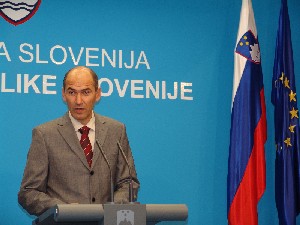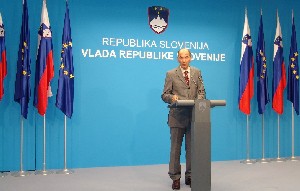
FOTO: Office of Prime Minister
The Prime Minister began by presenting statistical data referring to the 15-year period of Slovenia's independence. At the time of its independence Slovenia had 1,998,912 inhabitants, a number which last year had already exceeded 2 million. In the last 15 years the number of inhabitants has increased by just over four thousand. "This is a relatively modest figure, but there is reason for satisfaction. In a period when the population of Bulgaria decreased from 10 to 9 million and of the Russian Federation from 150 to 142 million, Slovenia succeeded not only in maintaining but even in slightly increasing its population," stressed Janša.
In the same period GNP rose by 56% and wages went up by 57% in real terms. In 1991 inflation was 118%. By the end of last year the average rate of inflation was down to 2.5% , which was also one of the criteria to be met in order to be able to adopt the euro. He added that today, in comparison with 15 years ago, one has to work less to be able to buy the same goods, citing the example of the Renault Clio: to buy one in 1991 one had to work 4300 hours, against 2600 hours today. Ten years ago Slovenia's purchasing power per inhabitant was 68% of the European union average, while today it is 80%.
What also raises optimism is the fact that the educational structure of the population has improved considerably. According to the 1991 census we had a good half of the population who had at least completed secondary schooling, while according to the 2002 census, the figure had already reached two-thirds. The number of persons who graduated from vocational colleges and universities increased in the same period by 4 percentage points. The number of post-secondary vocational and undergraduate students has doubled since 1991 and is now over 80,000. The number of post-graduate students has increased even more – five fold.
This year the number of unemployed persons is the lowest in the whole 15-year period. The number of registered cars has increased by over one-half since 1991. Presently, more than 80% of households have a car. The number of dwellings increased over the same period by almost 14%, and there was also an increase in their average size. According to the last census it was 74 m2 against 67 m2 in 1991.
In the last ten years electricity consumption was up by 30%, yet we succeeded in reducing our greenhouse emissions by 20%. The per-capita quantity of waste dumped in municipal landfill sites diminished by 26% over the same period.

FOTO: Office of Prime MInister
In the continuation of the press conference the prime minister highlighted Slovenia's future goals. "Slovenia has ambitious goals for the next period. In the past 15 years we succeeded in securing our future by integration in the European Union and NATO, and we created a stable national and international environment that is more favourable than at any period in our history. Now is the time to set ourselves new, highly ambitious goals," declared the prime minister, adding that Slovenia's aspiration is to become one of the most successful countries in the world over the next 10 to 15 years. "We aspire to reach a perfect synergy between economic effectiveness, social justice and preservation of the environment. Reforms that will be implemented in the next years will step up economic development, and increased investing in knowledge will make the most of the country's potential that has not yet been fully used. We must be inspired by those moments in our history that were a source of national unity, and we must focus our attention on the challenges of the future in order to be able to overcome the schism of the 20th century that is still hampering our development. By promoting excellence in science and culture we will, much more than in the past, work to increase our self-esteem," said the prime minister.
Prime Minister Janša concluded by saying that the introduction of the euro in 2007 is one of the nicest gifts Slovenia could wish for on its 15th anniversary. Not only it is a gift for Slovenia, it is also a gift of Slovenia to the European Union.